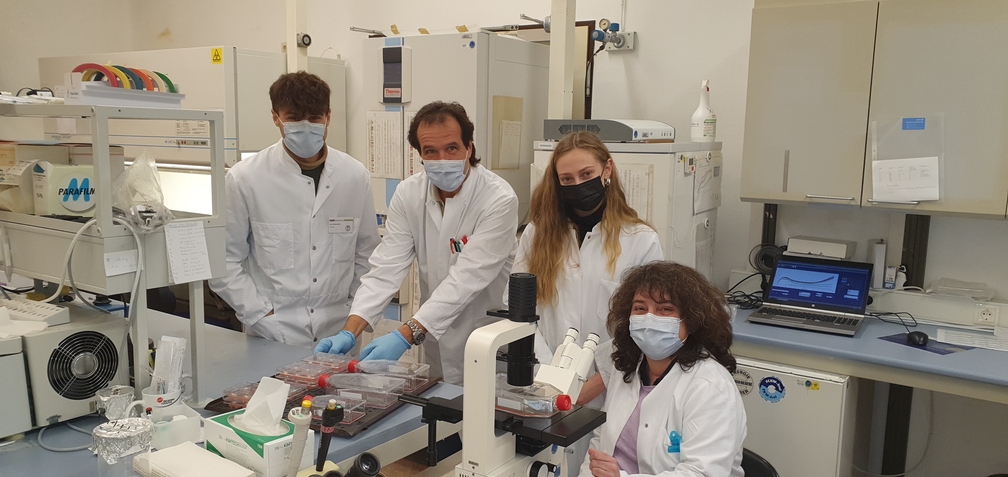
The research group is interested in the characterization of cytotoxic- and regulatory properties of γδ T lymphocytes and their role in tumor immunology with a focus on ductal pancreatic adenocarcinomas (PDAC) and ovarian carcinomas.
Group leader:
,
Group members:
,
Cytotoxic γδ T lymphocytes are an attractive subpopulation of T lymphocytes, which offer certain advantages for novel strategies of T cell-based immunotherapy due to their plasticity in bridging innate and adaptive immunity. Cytotoxic lymphocytes can infiltrate into lymphomas and numerous epithelial tumors. Several γδ T lymphocytes recognize phosphorylated intermediates of the endogenous Mevalonate metabolic pathway in a HLA-independent manner. These intermediates often accumulate in tumor cells due to a dysregulation. The in vivo-relevance of human cytotoxic γδ T lymphocytes towards different tumour entities has already been demonstrated in various animal models as well as in clinical trials. Our recent studies in cooperation with Prof. M. Peipp (Dep. of Stem Cell- and Immunotherapy, UKSH) and Prof. S. Sebens (Institute of Experimental Cancer Research, UKSH, CAU Kiel) demonstrated that bispecific antibodies enhanced cytotoxicity designed of adoptively transferred γδ T lymphocytes against pancreatic tumors grafted into immunocompromized mice.
The activation of cytotoxic tumor-infiltrating T lymphocytes can be negatively influenced by e.g. an immunosuppressive tumor environment, the accumulation of regulatory αβ- or γδ T lymphocytes in the tumor, different resistance mechanisms of the tumors or the induction of senescence/dormancy.
A substantial aim of our studies is to investigate the phenotypic and genotypic γδ TCR repertoire and the functional anti-tumor capacity of tumor-infiltrating γδ T lymphocytes of fresh tumor tissue in comparison to γδ T lymphocytes of autologous blood of pancreatic- or ovarian cancer patients. This work is performed in close cooperation with the working groups of Prof. Dirk Bauerschlag (Clinic for Gynecology and Obstetrics, UKSH, Kiel) and Prof. M. Peipp (Dep. of Stem Cell- and Immunotherapy, UKSH) as well as the DFG-funded research group FOR2799 and the company Boehringer Ingelheim (Vienna, Austria). More insights into the molecular mechanisms of signaling pathways regulating cytotoxicity, proliferation and cytokine release of the different T cell subsets in the blood versus the tumor will help to improve the preparation of appropriate bispecific antibodies. The generation and analysis of different bispecific antibody constructs in the targeting of γδ T lymphocytes to solid tumors is another of our cooperation projects together with Prof. M. Peipp and the company Evobright GmbH (Vienna, Austria).
Additionally, we examine the different immunosuppressive mechanisms that prevent an effective immune response of tumor-infiltrating γδ T lymphocytes and possibilities to enhance cytotoxic activity of tumor-infiltrating γδ T lymphocytes by the usage of bispecific antibodies and / or Toll-like receptor agonists.
Our research projects in cooperation with our different collaborators should provide better insights in the role of γδ T lymphocytes in immune response and help to optimize immunotherapies.
Oberg HH, Janitschke L, Sulaj V, Weimer J, Gonnermann D, Hedemann N, Arnold N, Kabelitz D, Peipp M, Bauerschlag D, Wesch D. J Leukoc Biol. 2020, 107:1081-1095.
Oberg HH, Kellner C, Gonnermann D, Sebens S, Bauerschlag D, Gramatzki M, Kabelitz D, Peipp M, Wesch D (2018). Front Immunol. 2018, 9:814.
Gonnermann D, Oberg HH, Kellner C, Peipp M, Sebens S, Kabelitz D, Wesch D. OncoImmunol. 2015, 4: e988460.
4. Novel Bispecific Antibodies Increase γδ T-Cell Cytotoxicity against Pancreatic Cancer Cells
Oberg HH, Peipp M, Kellner C, Sebens S, Krause S, Petrick D, Adam-Klages S, Röcken C, Becker T, Vogel I, Weisner D, Freitag-Wolf S, Gramatzki M, Kabelitz D, Wesch D. Cancer Res. 2014, 74:1349-1360.
5. Toll-like receptors 3 and 7 agonists enhance tumor cell lysis by human γδ T cells
Shojaei H, Oberg HH, Juricke M, Marischen L, Kunz M, Mundhenke C, Gieseler F, Kabelitz D, Wesch D. Cancer Res. 2009, 69:8710-8717.
6. Direct costimulatory effect of TLR3 ligand poly(I:C) on human γδ T lymphocytes
Wesch D, Beetz S, Oberg HH, Marget M, Krengel K, Kabelitz D. J Immunol. 2006, 176:1348-1354.
Prof. Dr. rer. nat. Daniela Wesch
PD Dr. sc. hum. Hans-Heinrich Oberg
University Hospital Schleswig-Holstein
Institute of Immunology
Arnold-Heller-Straße 3
Haus U30
24105 Kiel